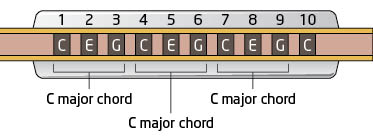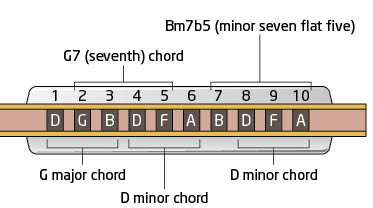A chord is a set of three or more notes sounded simultaneously. Chords are most often played as accompaniment to other instruments. For instance, a piano player might play a series of chords, called a chord progression, while a guitar player plays a solo over those chords.
The Main Types of Chords
Chords come in a wide variety of types based on the specific notes they contain. For instance, some chords sound harmonious and pleasant, while others sound jarring or foreboding. The most popular types of chords are major, minor, and seventh chords.
Major chords: Sound bright and pleasant
Minor chords: Sound dark and menacing
Seventh chords: Sound unresolved and somewhat dissonant—neither bright nor dark
The Chords of the C Harmonica
All harmonicas, including diatonic harmonicas, are capable of producing at least a few chords. On the C harmonica, it’s possible to play at least one of each of the three main types of chords. The chords you can play, and the notes you must play simultaneously in order to sound them, are:
C major: Blow holes 1–2–3, 4–5–6, or 7–8–9
G major: Draw holes 1–2–3, or 1–2–3–4
G7 (seventh): Draw holes 2–3–4–5
D minor: Draw holes 4–5–6, or 8–9–10
The fifth and final chord you can play on the C harmonica is called a “B minor-seven flat-five,” a chord that combines the qualities of a minor and a seventh chord. Play it by drawing holes 3–4–5–6 or 7–8–9–10.
Blow Chords

Draw Chords

How to Position Your Mouth to Play Chords
To play chords, use the same hand and mouth positioning that you’d use for tongue blocking, but keep your tongue at the bottom of your mouth, away from the holes. Since your mouth and lips cover 3–4 holes naturally, you’ll only need to shift the harmonica in order to position the right holes to your lips. For instance, to play a C major chord:
Place the harmonica in your mouth.
Move the harmonica to align holes 1–2–3 with the area that your lips cover.
Exhale from your diaphragm to blow notes 1–2–3 and sound the C major chord.
Unless you’re familiar with the different sounds of major, minor, and seventh chords, it may be tough to tell whether you’re playing the right notes of the chord. Start with the C major chord by following the steps above. The chord you play should sound bright, happy, and resolved. Try playing the D minor chord next (draw 4–5–6 or 8–9–10). It should sound dark and brooding, entirely unlike the C major chord. If the chords you play match these descriptions, you’re likely playing the right notes.
When Do Harmonica Players Play Chords?
The limited number of chords that the diatonic harmonica can produce makes it unlikely that you’ll ever use the harmonica to play chords as accompaniment for another instrument. Instead, you’ll likely play chords as part of your harmonica solos. If you’re already a guitar player, for example, you might play harmonica chords as a solo over a chord progression on the guitar. Harmonica players such as Bob Dylan and Neil Young have popularized this style of playing harmonica chords
Playing Arpeggios Instead of Chords
Since the number of actual chords that can be played on a diatonic harmonica is very limited, harmonica players usually play chords as arpeggios. An arpeggio is a version of a chord in which you play the notes of a chord separately rather than simultaneously. Harmonica players play arpeggios as substitutes for chords that are impossible to play on the diatonic harmonica they’re using.
For instance, if you wanted to play an E minor chord, you would instead have to play an arpeggio containing the notes of the E minor chord: E, G, and B. In order to play arpeggios, you need to know:
The individual notes that make up the chord: Consult a chord dictionary online or in print.
How to play those notes on your harmonica:
Some chords include notes that will require special techniques to sound, such as bends.



